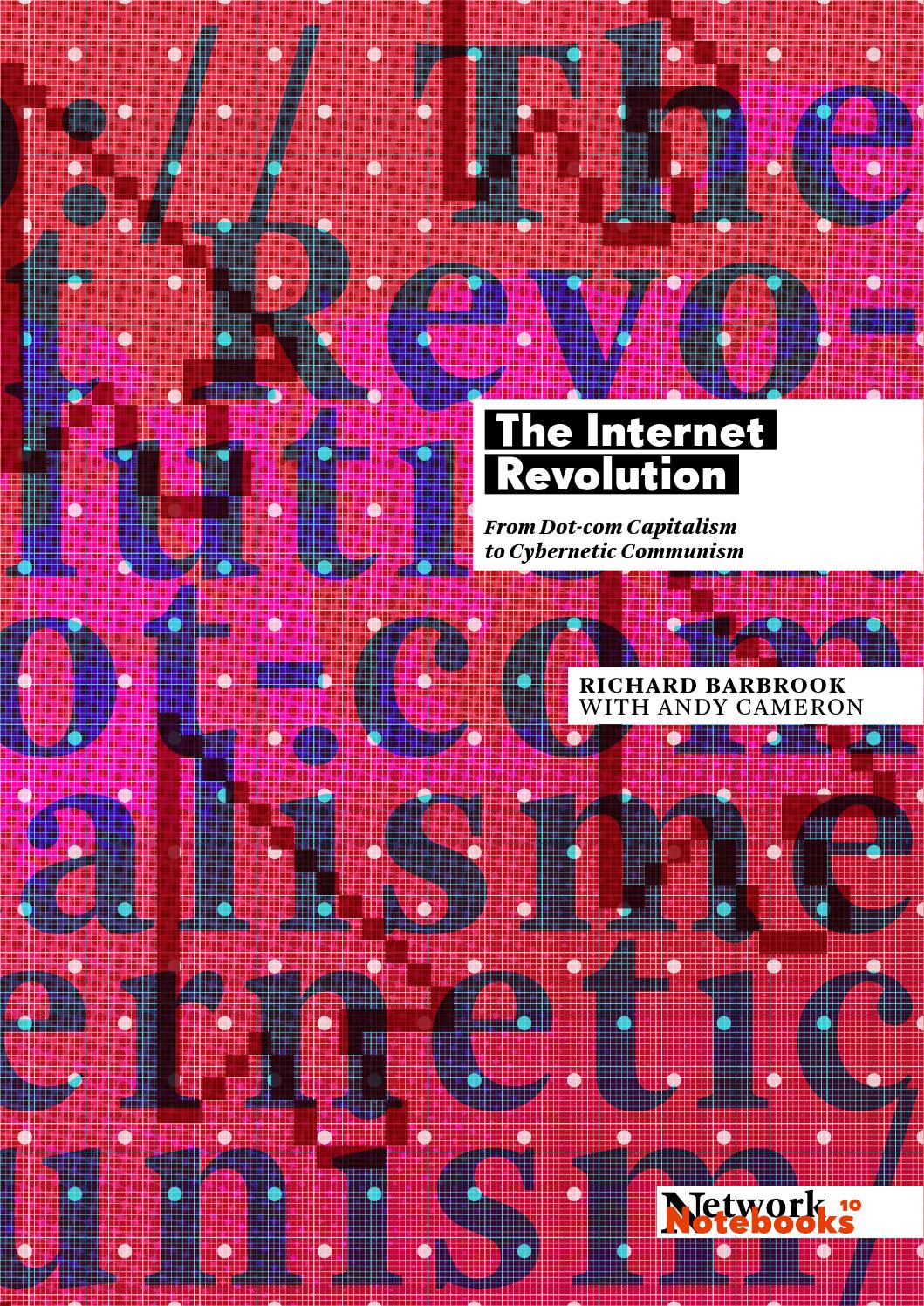Richard Barbrook with Andy Cameron: The Internet Revolution: From Dot-com Capitalism to Cybernetic Communism (2015)
Filed under book | Tags: · californian ideology, capitalism, communism, cybernetics, cyberspace, internet, libertarianism, neoliberalism, net criticism, silicon valley, technology, virtual reality

“Richard Barbrook and Andy Cameron’s The Californian Ideology, originally published in 1995 by Mute magazine and the nettime mailinglist, is the iconic text of the first wave of Net criticism. The internet might have fundamentally changed in the last two decades, but their demolition of the neoliberal orthodoxies of Silicon Valley remains shocking and provocative. They question the cult of the dot-com entrepreneur, challenging the theory of technological determinism and refuting the myths of American history. Denounced as the work of ‘looney lefties’ by Silicon Valley’s boosters when it first appeared, The Californian Ideology has since been vindicated by the corporate take-over of the Net and the exposure of the NSA’s mass surveillance programmes.
Published in 1999 at the peak of the dot-com bubble, Richard Barbrook’s Cyber-Communism offers an alternative vision of the shape of things to come, inspired by Marshall McLuhan’s paradoxical ‘thought probes’. With the Californian Ideology growing stronger, the Net was celebrated as the mechanical perfection of neoliberal economics. Barbrook shows how this futurist prophecy is borrowed from America’s defunct Cold War enemy: Stalinist Russia. Technological progress was the catalyst of social transformation. With copyright weakening, intellectual commodities were mutating into gifts. Invented in capitalist America, the Net in the late-1990s had become the first working model of communism in human history.
In an introduction written specially for this 20th anniversary edition, Richard Barbrook takes a fresh look at the hippie capitalists who shaped Silicon Valley and explains how their influence continues to this day. These thought probes are still relevant in understanding the contradictory impact of ubiquitous social media within the modern world. As McLuhan had insisted, theoretical provocation creates political understanding.”
Publisher Institute of Network Cultures, Amsterdam, Oct 2015
Network Notebooks series, 10
Creative Commons Attribution-NonCommercial-ShareAlike 4.0 International License
ISBN 9789492302014
51 pages
Replies to ‘The Californian Ideology’ published in Mute 4 (Spring 1996): Introduction, Louis Rossetto (Wired’s editor-in-chief), Franco (Bifo) Berardi, Celia Pearce.
PDF, PDF (4 MB)
EPUB, EPUB (3 MB)
Issuu
David G. Post: In Search of Jefferson’s Moose: Notes on the State of Cyberspace (2009)
Filed under book | Tags: · cyberspace, database, dns, filesharing, intellectual property, internet, networks

A leading Internet authority applies the political thought of Thomas Jefferson to the issue of how cyberspace should be governed.
In 1787, Thomas Jefferson, then the American Minister to France, had the “complete skeleton, skin & horns” of an American moose shipped to him in Paris and mounted in the lobby of his residence as a symbol of the vast possibilities contained in the strange and largely unexplored New World. Taking a cue from Jefferson’s efforts, David Post, one of the nation’s leading Internet scholars, here presents a pithy, colorful exploration of the still mostly undiscovered territory of cyberspace–what it is, how it works, and how it should be governed.
What law should the Internet have, and who should make it? What are we to do, and how are we to think, about online filesharing and copyright law, about Internet pornography and free speech, about controlling spam, and online gambling, and cyberterrorism, and the use of anonymous remailers, or the practice of telemedicine, or the online collection and dissemination of personal information? How can they be controlled? Should they be controlled? And by whom? Post presents the Jeffersonian ideal–small self-governing units, loosely linked together as peers in groups of larger and larger size–as a model for the Internet and for cyberspace community self-governance. Deftly drawing on Jefferson’s writings on the New World in Notes on the State of Virginia, Post draws out the many similarities (and differences) between the two terrains, vividly describing how the Internet actually functions from a technological, legal, and social perspective as he uniquely applies Jefferson’s views on natural history, law, and governance in the New World to illuminate the complexities of cyberspace.
In Search of Jefferson’s Moose is a lively, accessible, and remarkably original overview of the Internet and what it holds for the future.
Publisher Oxford University Press, 2009
Law and Current Events Masters
ISBN 0195342895, 9780195342895
244 pages
PDF (updated on 2012-9-23)
Comments (2)Patrice Flichy: The Internet Imaginaire (2007)
Filed under book | Tags: · 1990s, arpanet, computing, cyberpunk, cyberspace, freenet, history of communications, history of computing, history of technology, internet, networks, technology, usenet, utopia, virtual communities, virtual reality, web, wired

In The Internet Imaginaire, sociologist Patrice Flichy examines the collective vision that shaped the emergence of the Internet—the social imagination that envisioned a technological utopia in the birth of a new technology. By examining in detail the discourses surrounding the development of the Internet in the United States in the 1990s (and considering them an integral part of that development), Flichy shows how an entire society began a new technological era. The metaphorical “information superhighway” became a technical utopia that informed a technological program. The Internet imaginaire, Flichy argues, led software designers, businesses, politicians, and individuals to adopt this one technology instead of another.
Flichy draws on writings by experts—paying particular attention to the gurus of Wired magazine, but also citing articles in Time, Newsweek, and Business Week—from 1991 to 1995. He describes two main domains of the technical imaginaire: the utopias (and ideologies) associated with the development of technical devices and the depictions of an imaginary digital society. He analyzes the founding myths of cyberculture—the representations of technical systems expressing the dreams and experiments of designers and promoters that developed around information highways, the Internet, Bulletin Board systems, and virtual reality. And he offers a treatise on “the virtual society imaginaire,” discussing visionaries from Teilhard de Chardin to William Gibson, the body and the virtual, cyberdemocracy and the end of politics, and the new economy of the immaterial.
Publisher MIT Press, 2007
ISBN 0262062615, 9780262062619
255 pages
PDF (updated on 2012-7-25)
Comment (1)
